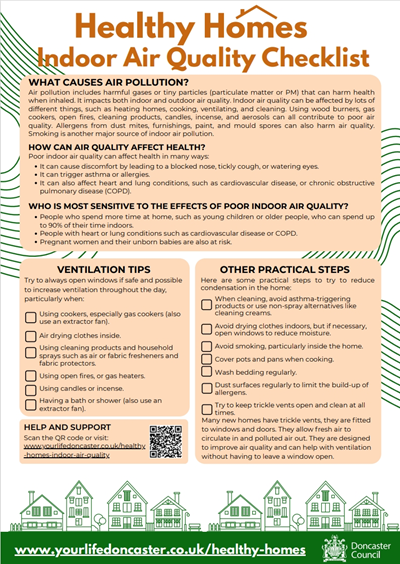Healthy Homes: Indoor Air Quality

Air pollution includes gases or small particles (known as particulate matter or PM) that can harm health if breathed in. Air pollution affects air quality and can impact health both inside buildings, as well as outdoors. Indoor Air Quality can be affected by lots of different things, such as heating homes, cooking, ventilating, and cleaning
Heating homes using wood burners impacts air quality, as well as fumes from gas cookers and open fires. Cleaning products such as disinfectant household sprays and air fresheners or room sprays all affect air quality. Even burning candles or incense and using aerosol deodorants can impact the quality of air.
Allergens from dust mites, paintwork, and furnishings can also affect air quality, and mould spores caused by damp can have a negative effect. Smoking can be another serious source of unhealthy air pollution inside the home.
Indoor Air Quality Checklist
- Indoor Air Quality checklist
- Download (173KB - PDF)
How might this impact health?
Poor indoor air quality can affect health in many ways:
- It can cause discomfort by leading to a blocked nose, tickly cough, or watering eyes.
- It can trigger asthma or allergies.
- It can also affect heart and lung conditions, such as cardiovascular disease, or chronic obstructive pulmonary disease (COPD)
Certain groups can be more effected by poor indoor air quality, particularly:
- People who spend more time at home, such as young children or older people, who can spend up to 90% of their time indoors.
- People with heart or lung conditions such as cardiovascular disease or COPD.
- Pregnant women and their unborn babies are also at risk.
What steps can be taken?
Here are some practical steps to try to improve air quality in the home.
Try to always open windows if safe and possible to increase ventilation throughout the day, particularly when:
- Using cookers, especially gas cookers (also use an extractor fan)
- Air drying clothes inside
- Using cleaning products and household sprays such as air or fabric fresheners and fabric protectors
- Using open fires, or gas heaters
- Using candles or incense
- Having a bath or shower (also use an extractor fan)
Other practical steps also include:
- When cleaning, avoid products that trigger asthma or try using non-spray alternatives such as cleaning creams.
- Try to avoid drying clothes inside, but when you do, make sure to open windows to reduce moisture in the air.
- Avoid smoking, particularly inside the home.
- Cover pots and pans when cooking.
- Wash bedding regularly.
- Dust surfaces regularly to limit the build-up of allergens.
- Many new homes have trickle vents, they are fitted to windows and doors and are a device that allows fresh air to circulate in and polluted air out. They are designed to improve air quality and can help with ventilation without having to leave a window open. Try to keep trickle vents open and clean at all times.
What support is available?
If ventilation is not working, for example, if extractor fans in the kitchen and bathroom are not working, if excessive noise prevents using fans, or if trickle vents are blocked or damaged then look for support.
- If you rent your home and feel that there are hazards that the landlord has been unable, or is unwilling to put right, you can contact the Council’s Housing Enforcement Team for advice. They may be able to assist and inspect to determine if there is action that can be taken: visit the council website or call 01302 737573.
- If your home is a St Leger Homes property you can report a repair at any time, visit St Leger's website or call 01302 862862.
- Doncaster Repair and Support Service carry out minor repairs and small maintenance jobs within the home for elderly or disabled people. Visit the council website or call 01302 736574
- For support with stopping smoking visit our Smokefree webpage or call 0800 612 0011 or test ‘YSF’ to 80800
- For more information on how damp and mould affects indoor air quality, visit our damp and mould page.
- Use our helpful checklist for tips and practical steps to take in the home Indoor Air Quality checklist

